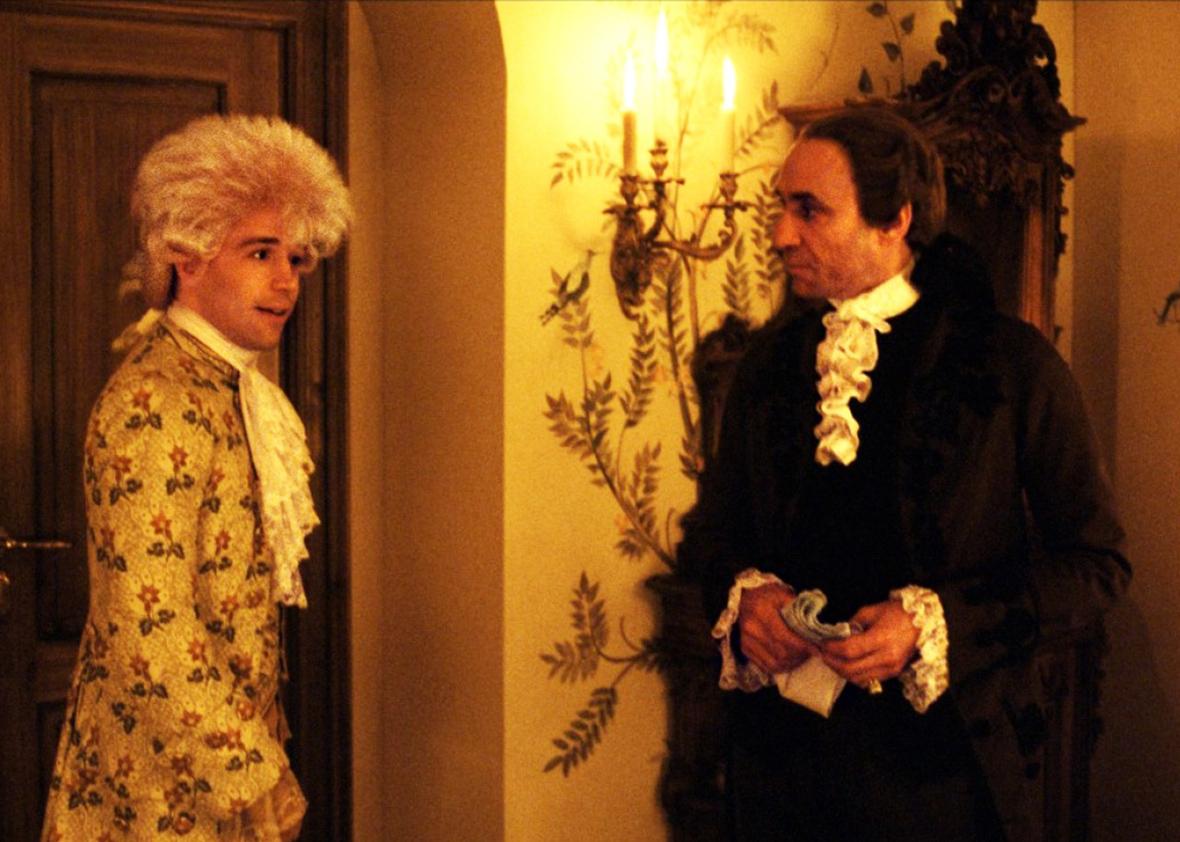The British playwright Peter Shaffer, who died Monday at the age of 90, will be remembered most for two Tony-winning plays he wrote in the 1970s: Equus and Amadeus. Both were turned into films, both garnered Shaffer Oscar nominations (he won for the second), and both are rightfully considered classics. Equus is the kind of energetic, allusive play that opens up an aspiring theater artist’s horizons when she first reads it, but Amadeus is Shaffer’s true masterpiece. Where Equus’ critique of psychoanalysis and consumer culture is steeped in Jung, Amadeus is the work where Shaffer creates his own archetypes: a durable, and remarkably influential, allegory (I hesitate to write) about artistic creation. You can see its impact on Broadway right now in Hamilton, for which Amadeus is clearly a formative influence, and feel the power of its understanding of the relationship between genius and craft whenever we debate the true value of an MFA, or the worth of a perfect sentence.
Amadeus is a chronicle of the (almost entirely fictionalized) rivalry between Wolfgang Amadeus Mozart and the Viennese court composer Antonio Salieri. Salieri, who narrates the play and the film, is the “patron saint of mediocrities” whose work is always impeccably crafted but never inspired. Mozart, on the other hand, is all inspiration. He works tirelessly but never revises, instead taking what appears to be dictation from God himself. He takes this talent for granted, drinking, womanizing, running up debts, taunting the world with his “obscene giggle,” while Salieri remains celibate, cautious, courteous, doing everything society expects of him. This rivalry eventually drives Salieri to kill Mozart through working him to death, and, in the aftermath of Mozart’s death, to a grief that becomes madness.

Screenshot via ingecenter
Nearly all of us have the people in our lives against whom we hold ourselves, who are better than us, who achieve more that we do, who are just a little bit more inspired. And nearly everyone who has tried to create something of artistic value feels, when he’s blocked, like Salieri surrounded by a thousand Mozarts. That feeling is only exaggerated by social media: I’ll cop to unfollowing people who tweet about their staggering daily word counts. One prolific, well-regarded, best-selling writer I follow and admire announced she got tenure with a post saying she was “meh” about it, and at that moment I understood why Salieri burned his crucifix and cursed the Almighty for not blessing his most faithful servant with talent.
It is in its bombastic, tortured approach to the question of talent that Amadeus achieves the stature of masterpiece. What Amadeus knows is that the most vital part of art, and of art’s creation, is ineffable, and terrifyingly uncontrollable, and in many ways indescribable. This is the frightening part of making—or writing criticism about, or teaching—art. If we can’t control it, how can we be certain we can keep it? If we can’t describe it, how do we know what is good? In Amadeus, Salieri experiences this firsthand when he sees Mozart’s sheet music for the first time and says, “On the page, it looked [like] nothing.” But when he hears it: “This was a music I’d never heard … it seemed to me I was hearing the voice of God.” You needn’t be religious to understand what Salieri means here. Talent, or inspiration, or genius, appears to flow from outside of us, and cannot be explained. It has, at its best, the force of the divine, terrifying and thrilling at once.
Amadeus, Milos Forman’s film, is remembered now, I think, as a conventional, naturalistic period piece full of giant, operatic performances to match its score. But the play, which Shaffer considered a distinct work with the same story, isn’t really naturalistic at all, and even the film yields surprisingly rich layers of interpretation when you dig into it. Neither Salieri nor Mozart are fully human. They’re doubles of each other in a parable about the creation of Art, compressed and pressurized to the point where Salieri becomes Craft itself and Mozart Talent. Craft is beholden to Talent and jealous of its power, unable to fully grasp what it can do. Talent is profligate, unfaithful, and never pays its debts. Talent is vulgar—“I’m a vulgar man,” Mozart says, “but I assure you my music is not,”—while Craft is restrained. Talent is impractical, Craft censorious. Talent cannot be embarrassed, while Craft lives in fear of mortification. Toward the end of the film, as Mozart’s mother-in-law berates him (with ample justification) for ruining her daughter, her cries become, in Mozart’s mind, notes, and then, finally, an aria. She’s right about him: He is a “selfish little thing,” for whom “no one exists but … you and your music.” No matter what the “real” Mozart was actually like, in Shaffer’s construction of genius vs. craft, it’s that very single-mindedness that made him Mozart and that guaranteed he’d be remembered forever.
Talent also cannot survive on its own and Craft can—Salieri outlives Mozart by decades—but Craft can never make great art all by itself. In one thrilling sequence, though, Craft comes to Talent’s aid to help him finish his work. Tom Hulce’s Mozart lies on his deathbed, struggling to finish the Requiem that F. Murray Abraham’s Salieri, masquerading as a patron, has demanded of him. Salieri joins him there and transcribes the work that Mozart is too weak to write down. Talent softly sings each line to Craft, and, as Salieri writes them, as their logic becomes clear to him, we begin to hear them on the soundtrack. Sometimes Salieri can anticipate what the next note is, sometimes he must beg Mozart to slow down so he can figure it out, as both Craft and Talent become enraptured by what they can do together.
The film is probably too hard on poor old Craft, who is left to experience the nightmare we all fear: What little talent we have deserts us, and we must suffer through “years of torture” without it. In the real world, pure talent and three dollars will get you a cup of coffee. Craft can do many great things, and Salieri achieves greatness within his own life despite lacking Mozart’s genius, but his achievements curdle in a vinegar of envy and spite.
Other films, like Christopher Nolan’s The Prestige, owe quite a bit to Amadeus’ portrait of rivals as doubles, but you can most easily see Amadeus’ influence today in Hamilton. In telling the story of Alexander Hamilton through the eyes of Aaron Burr, the musical borrows extensively from Amadeus’ structure, its choice of having the antagonist as narrator, and the psychodynamics of its core rivalry. Hamilton’s thematic concerns are different from Amadeus’, but it still turns Burr into Salieri, wondering, awe-struck and slack-jawed, at Hamilton’s ability to “write day and night like it’s going out of style.” At the end, Burr—again like Salieri—kills his rival only to discover that “he may have been the first to die/ but I’m the one who paid for it.”
Since Amadeus won eight Oscars, it’s permeated the culture enough that years later, in the meta-action comedy Last Action Hero, Arnold Schwarzenegger is warned against trusting a character played by F. Murray Abraham because “he killed Mozart!” The best parody of it can be found in the 30 Rock episode “Succession,” in which Judah Friedlander’s Frank plays Salieri to Tracy Morgan’s Amadeus as they struggle to make a realistic porn video game and traverse the uncanny valley.
Amadeus’ multilayered truths—about rivalries, about genius and craft, about the devastating feeling that you are not worthy of receiving the inspiration your work requires—are the keys to its enduring place in our culture. In Shaffer’s portrait of Talent and Craft as a pair of equally compelling and detestable grotesques, the movie and play reflect back to us our own psyches as we struggle to create. We’ve all been Salieri, lusting to finally, just for one moment, have the grace to be Mozart.
